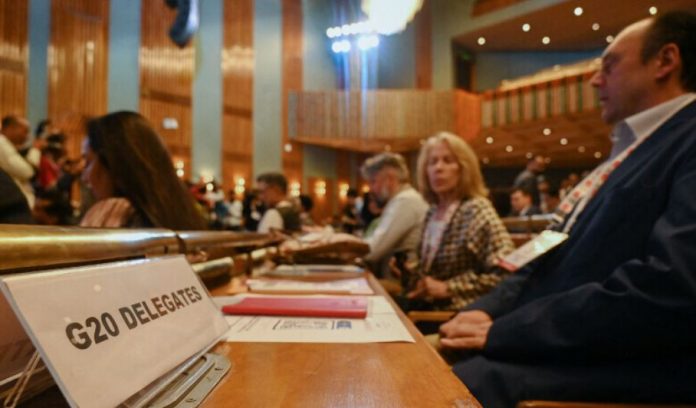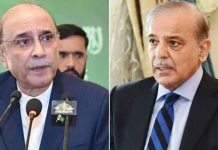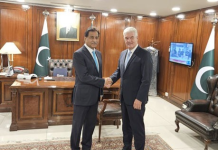A G20 tourism meeting began on Monday under tight security in occupied Kashmir as New Delhi seeks to project an image of normalcy in a region wracked for decades by violence.
Both China and Pakistan have condemned holding the event in the occupied valley.
India wants to show that what officials call “normalcy and peace” are returning to the region after New Dehli revoked its limited autonomy and took direct control in 2019, imposing an extended lockdown.
Since then, Kashmiri fighters have largely been crushed — although young men continue to take up arms — and the annual death toll, once in the thousands, has been on a downward trend, with 253 fatalities last year.
Now India is promoting tourism in the region, with its spectacular mountain scenery and signs at the airport declaring it “paradise on earth”. More than a million Indian citizens visited last year.
But dissent has been criminalised, media freedoms curbed and public protests limited, in what critics say is a drastic curtailment of civil liberties by New Delhi.
Police said last week that security had been beefed up “to avoid any chance of an attack during the G20” meeting, and on Monday soldiers and armoured vehicles were deployed at multiple locations in Srinagar.
But many checkpoints — wrapped in metal mesh and barbed wire — had been dismantled overnight, and some paramilitary police stood hidden behind G20 advertising panels in what appeared to be an effort to minimise the security forces’ visibility.
The People’s Anti-Fascist Front, a new rebel group that emerged in occupied Kashmir after 2019, issued a statement condemning the event and threatening to “deploy suicide bombers”.
“Today, tomorrow or day after. It will come,” it said.
Bilawal bashes India for ‘show of arrogance’
Meanwhile, in an address to the AJK Legislative Assembly today, Foreign Minister Bilawal Bhutto-Zardari bashed India for its “display of arrogance”.
“India’s continued denial of the rights of the Kashmiri people is a wrongful and illegal act,” he said, stressing that “no amount of diplomatic duplicity or Indian state-perpetrated terror can change this fact”.
He lamented that occupied Kashmir had become an “open prison” today where Muslims were being forced to breathe fear. “This mayhem continues under draconian laws allowing continuity to the Indian occupying forces.”
Bilawal highlighted that New Delhi’s “wretched, systematic and perpetual barbarism not just violates international law but it makes a mockery of the fundamental human rights”.
“How can the world be a bystander when a large country usurps the rights guaranteed by the security council?” the minister asked.
He reiterated that holding the G20 moot in occupied Kashmir was yet another “show of arrogance” on India’s part. “How can India possibly claim that normalcy has returned to occupied Kashmir?
“I wish to remind the Indian leaders that unilateral steps in held Kashmir will neither accord democracy to their occupation nor suppress the true occupation of the Kashmiri people,” he asserted.
“If India wants to be a superpower, then it needs to act like a superpower,” Bilawal said.
He added that his presence in AJK proved the intergenerational support and commitment to the Kashmir cause. “We want good relations with our neighbours, including India, but good relations cannot be achieved through a disputed resolution.”
‘Terrorist-infested places’
The three-day gathering will take place at a sprawling, well-guarded venue on the shores of Dal Lake in Srinagar.
Two Indian government ministers are attending, but several Western nations are sending only locally-based diplomatic staff.
G20 member China, which has its own territorial disputes with India, has refused to attend, and no delegations are expected from Turkiye or Saudi Arabia.
Meanwhile, questions have been raised over the choice of location.
“Does the Modi government think that tourism can be promoted in closed conference halls next to a scenic lake being patrolled by marine commandos, with surveillance drones overhead?” columnist Bharat Bhushan wrote in the Deccan Herald newspaper.
To visit occupied Kashmir, foreign journalists require special permission, which is not normally forthcoming, though it has been granted for the event.
The permits are valid only for coverage of the G20 meeting itself and limited to the city of Srinagar. Holders are required not to “propagate anti-India narratives”, nor visit “terrorist-infested places without prior permission”.
India holds the G20 presidency for 2023, and has planned more than 100 meetings across the country.
It is locked in a military standoff with China along their mostly undemarcated border in the Ladakh region.
Beijing also claims the Indian state of Arunachal Pradesh in full as part of Tibet, and it considers Kashmir a “disputed territory”.
“China firmly opposes holding any form of G20 meeting in disputed territory and will not attend such meetings,” foreign ministry spokesman Wang Wenbin told reporters last week, after Beijing also stayed away from events in both Ladakh and Arunachal Pradesh.
Last week, the UN Special Rapporteur on Minority Issues, Fernand de Varennes, said New Delhi was seeking to use the G20 meeting to “portray an international seal of approval” on a situation that “should be decried and condemned”. India rejected the comments.
Residents have chafed under the stepped-up security measures.
Hundreds have been detained in police stations and thousands, including shopkeepers, have received calls from officials warning against any “signs of protest or trouble”, a senior official told AFP on condition of anonymity.

















